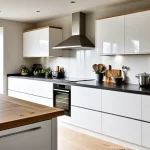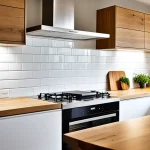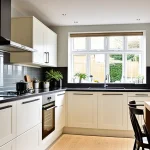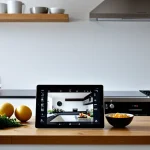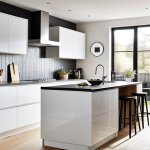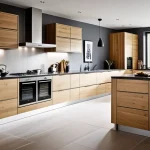Transforming the Modern UK Kitchen: Key Tech Trends
The UK kitchen technology trends reveal a swift integration of smart appliances, IoT, and AI across homes, reshaping how kitchens operate. This transformation is driven by the increasing popularity of smart kitchen innovations like connected ovens and refrigerators that offer remote control, recipe suggestions, and energy monitoring. Adoption rates demonstrate that a growing number of UK households embrace these technologies, seeking both convenience and efficiency.
IoT in UK homes allows appliances to communicate seamlessly, enabling features such as automatic grocery list updates or inventory management. These innovations influence kitchen design by prioritising space for smart devices and adapting layouts to support connected functionalities. Consequently, kitchens are evolving into interactive, intelligent spaces rather than purely functional rooms.
This might interest you : How do UK kitchens compare to European designs?
Moreover, smart home integration has made daily kitchen tasks more manageable. For example, sensors in smart fridges can alert users to expiry dates, reducing food waste while AI-driven devices personalise cooking experiences. The coupling of IoT in UK homes with smart appliances exemplifies how technology creates sophisticated, interconnected kitchen environments that balance utility with modern lifestyle demands.
Connected Appliances and Enhanced Kitchen Functionality
Smart appliances UK have become central to modern kitchen experiences, with smart fridges UK and ovens leading innovation. These connected kitchen devices enable users to control settings remotely, access recipe suggestions, and monitor food inventory, vastly improving cooking accuracy. For example, a smart fridge can track expiry dates and suggest meals based on available ingredients.
Also to see : How are UK kitchens addressing the demand for personalized spaces?
Voice assistants integrated into these smart appliances simplify routine tasks. By using voice commands, UK consumers can preheat ovens, set timers, or add items to shopping lists hands-free, enhancing convenience. Automation further reduces manual input, allowing for multitasking and streamlined meal preparation.
Connected kitchen devices also support energy efficiency. Smart ovens adjust cooking temperatures to optimise power consumption, while fridges regulate cooling based on usage patterns, contributing to sustainability goals in UK homes. These technologies transform kitchens into responsive environments that adapt to individual needs, showcasing how smart appliances UK improve both functionality and user satisfaction.
Practical Impacts on Daily Kitchen Experiences
Technology has significantly boosted kitchen efficiency in UK homes through automation and smart management tools. Automation in smart appliances reduces routine tasks, saving time during meal preparation. For instance, connected kitchen devices can automatically adjust cooking times and temperatures, ensuring consistent results while freeing homeowners to multitask.
Convenience technology such as voice assistants in smart fridges UK and ovens allows hands-free operation. Users can request status updates or add grocery items verbally, simplifying workflows and reducing disruption during busy periods. These tools actively anticipate needs, making kitchens more intuitive.
Sustainability is another essential gain from sustainable kitchen tech UK. Smart fridges monitor energy use and maintain optimal cooling, reducing wastage and electricity bills. Similarly, advanced sensors help manage food expiry dates, curbing spoilage and supporting eco-friendly food management.
In summary, the blend of smart appliances UK and connected kitchen devices optimizes daily routines by enhancing efficiency, convenience, and sustainability. These improvements directly address common kitchen frustrations, promoting a modern, enjoyable cooking environment aligned with contemporary lifestyles.
UK-Focused Case Studies and Market Adoption
Recent UK kitchen tech case studies highlight the real-world impact of smart kitchens on daily life. In urban London flats, families report significant time savings due to automation features in smart ovens and fridges, which streamline meal preparation and inventory management. Such case studies reveal how integrated devices reduce waste and energy consumption, proving their practical value.
Adoption statistics demonstrate a steady rise in smart kitchen device penetration across British households. Surveys indicate that over 40% of UK homes now incorporate at least one connected kitchen device, with younger demographics leading adoption. Notably, smart fridges UK and voice-controlled appliances show the fastest uptake, driven by consumer demand for convenience and sustainability.
British smart kitchen brands play a key role, offering tailored solutions that cater to UK lifestyle preferences. These brands often focus on seamless integration with popular IoT platforms to enhance user experience. Their innovations, including custom recipe apps and energy-efficient designs, further encourage widespread acceptance. Through these market dynamics, the UK stands out as a growing hub for smart kitchen technology adoption and innovation.
Benefits, Challenges, and the Future of Kitchen Technology in the UK
Understanding the UK kitchen tech benefits begins with recognising how convenience, sustainability, and personalisation have transformed kitchens. Smart appliances reduce manual effort, saving time and enhancing daily routines. Sustainable kitchen tech UK lowers energy use and food waste, aligning with growing environmental priorities. Personalised features adapt cooking settings to user preferences, improving meal quality and satisfaction.
However, challenges remain in widespread adoption. High initial costs deter some UK households from investing in smart appliances despite their long-term benefits. Concerns about data privacy also pose barriers, as connected kitchen devices often collect personal information. Furthermore, technical integration issues arise when mixing brands and platforms, complicating seamless user experience.
Looking ahead, future trends in UK kitchen technology promise even greater innovation. AI-powered cooking assistants and predictive maintenance will enhance smart appliances UK functionality. Integration with broader smart home systems is expected to deepen, creating fully interconnected environments. Moreover, advances in sustainable kitchen tech UK will focus on eco-friendly materials and energy optimisation.
These developments suggest a dynamic future for UK kitchens, balancing sophisticated tech benefits with ongoing challenges to adoption and usability.


